This article was medically reviewed by Luba Lee, FNP-BC, MS and by wikiHow staff writer, Janice Tieperman. Luba Lee, FNP-BC is a Board-Certified Family Nurse Practitioner (FNP) and educator in Tennessee with over a decade of clinical experience. Luba has certifications in Pediatric Advanced Life Support (PALS), Emergency Medicine, Advanced Cardiac Life Support (ACLS), Team Building, and Critical Care Nursing. She received her Master of Science in Nursing (MSN) from the University of Tennessee in 2006.
There are 21 references cited in this article, which can be found at the bottom of the page.
wikiHow marks an article as reader-approved once it receives enough positive feedback. This article received 16 testimonials and 88% of readers who voted found it helpful, earning it our reader-approved status.
This article has been viewed 288,073 times.
Creatine phosphokinase or creatine kinase (CPK) is an important protein enzyme found in different muscles and organs in your body, including your skeletal muscles, brain, and heart. While it plays an important role in your metabolism, high CPK levels may mean you have damaged your brain, heart, or muscle tissue.[1] Fortunately, you may be able to lower your CPK levels and improve your overall health naturally. However, see your doctor for a proper diagnosis to make sure you're getting the right treatment.
Steps
Improving Your Health
-
1Try the Mediterranean diet. The Mediterranean diet is a heart-healthy meal plan that limits the intake of salt, bad fats, and red meat. Eating more plant-based foods, like fruits and veggies, as well as whole grains and healthy fats may reduce your risk of heart disease.[2]
- Fish are a great source of protein you can eat on the Mediterranean diet.
-
2Eat foods that can help lower your cholesterol. Foods that help to lower your cholesterol levels in turn help to prevent heart disease. High CPK levels can indicate damage to the heart, so lowering your cholesterol might help prevent further damage.[3]
- Foods that may lower your cholesterol include oats, beans, eggplant, okra, nuts, grapes, strawberries, apples, soy, and fatty fish.[4]
Advertisement -
3Get plenty of omega-3s to improve your muscle health. Don’t let the word ‘fatty’ fool you—omega-3 fatty acids are essential nutrients when it comes to having a healthy body. They can help lower your risk of heart disease and increase your good cholesterol levels.[5]
- Omega-3 can be found in fish like sardines, anchovies and salmon; eggs, milk, milk products, flaxseeds, and nuts.
-
4Lower how much fat and salt you eat each day. High blood pressure and heart diseases are often seen in conjunction with high CPK levels.[6] You can lower your blood pressure by limiting the amount of salt you eat and reducing your fat intake.[7] Eat low-fat or non-fat dairy products like skim milk, low-fat yogurt, and cheese. Avoid very fatty foods like butter, gravies, and lard.
-
5Cut back on your protein and creatine intake. Try not to eat as much cooked meat, which contains a lot of creatinine. Additionally, consider cutting back on protein and creatine supplements, which may also cause your levels to go up.[8] Instead, look for more natural forms of protein, like lentils.[9]
- Eating a lot of cooked meat may show a “false positive,” or high amount of CPK levels in your blood.
-
6Remove alcohol from your diet. Drinking alcohol can increase your CPK levels, so eliminate it from your diet or cut back as much as possible.[10]
-
7Eat more garlic to improve your overall health. Garlic has long been known to promote a healthy heart. It lowers blood pressure and prevents platelet aggregation, both of which can improve your heart health.[11]
Regulating Your Physical Exercise
-
1Exercise regularly to keep your body healthy. Aerobic exercise, strength training, and stretching and flexibility all contribute to a healthy body. Aim to exercise for at least 30 minutes a day on 5 or more days per week.[12]
-
2Ask your doctor if high-intensity exercise is causing your CPK. Another common cause of elevated CPK level is strenuous exercise. While regular exercise is encouraged, a sudden increase to the intensity or amount of exercise you do can raise your CPK levels.[13]
- Exercises that involve weightlifting and downhill running cause higher increase in CPK levels.
-
3Avoid exercising the day before and the day of a CPK test. Strenuous exercise is actually a common cause of a falsely elevated CPK level in patients being tested for CPK levels. Because of this, it is important that you don’t exercise the day before or the day of your doctor’s appointment so that you don’t get a false reading of your CPK levels.[14]
Avoiding Certain Medications
-
1Ask your doctor if statins are increasing your CPK counts. Statins are medications that are effectively used to lower blood cholesterol levels. However, one of their side effects is rhabdomyolysis or breakdown of muscle tissue due to inflammation. Because of this mechanism, these drugs cause an elevated CPK level.[15]
- Types of statins include atorvastatin (Lipitor), rosuvastatin (Crestor), pravastatin (Lipostat), fluvastatin (Lescol), and simvastatin (Zocor).[16]
-
2Be aware that some other drugs can raise your CPK levels. If you are taking any of the drugs listed in this step, they might be the reason for your elevated CPK levels so you should talk to your doctor about trying different medications to treat your conditions. Other medications that can increase CPK levels include:[17]
- Certain beta-blockers (including pindolol and carteolol), antipsychotics, fibrates, isotretinoin, zidovudine, and colchicine.
-
3Talk to your doctor about changing your prescription, if it’s necessary. If you are taking any of the above-mentioned medications and are having an issue with elevated CPK levels, you might want to consider trying different medications. You can consult your doctor, tell him or her of your elevated CPK levels, and ask for a revision of your prescription.[18]
- If you can’t get a different prescription, your doctor will work with you to find another way to bring your CPK levels down.
When to Seek Medical Care
-
1Get a proper diagnosis if you don’t know the cause of your high CPK. Since there are many causes of CPK, it might take a while for your doctor to reach a conclusion. However, some causes of CPK require immediate treatment so that you can preserve your health, so it’s important to get your diagnosis. Then, talk to your doctor about the treatments available to you.[19]
- For instance, your high CPK levels could be caused by an injury, an infection, or a prescription medication. However, it could also be caused by a neuromuscular, metabolic, or rheumatologic condition, like arthritis or lupus.
- Some conditions may worsen if you don’t treat the underlying cause.
-
2Check with your doctor before using herbs and supplements. While herbs and supplements are usually safe, they’re not right for everyone, especially if you’re taking medications. They might interfere with your medication or worsen your condition. To be on the safe side, talk to your doctor before you start using herbal remedies.[20]
- Remind your doctor of the medications and supplements you’re already taking.
- Let your doctor know you’re working on lowering your CPK levels naturally. They may have additional advice to help you.
-
3See your doctor if you have symptoms of myopathy. Myopathy means that your muscles aren’t working correctly. This may sound scary, but treatments might be available to help you feel better. In some cases, myopathy can cause high CPK levels, as well as other symptoms. Visit your doctor if you notice a combination of the following symptoms, which vary:[21]
- Muscle weakness
- Rash
- Headaches
- Lung issues
- Heart disease
- Muscle imbalance
- Delayed muscle reactions
- Tingling or burning sensations in your muscles
- Muscle nodules
- Cognitive issues
- Seizures
-
4Get emergency care if you have the symptoms of a heart attack. Sometimes high CPK levels can mean you’re at risk for a heart attack. Try not to worry because you can get treatment. However, it’s important that you act fast if you may be having a heart attack. Go to an emergency room or call for help if you have the following symptoms:[22]
- Chest pain or pressure
- Shortness of breath
- Pain that spreads to your jaw, neck shoulder, arm, or back
- Nausea or heartburn
- Abdominal pain
- Fatigue
- Lightheadedness or dizziness
- Cold sweat
Expert Q&A
Did you know you can get premium answers for this article?
Unlock premium answers by supporting wikiHow
-
QuestionI am long distance runner. If I quit for a week and my levels come down, when can I run again?
 Luba Lee, FNP-BC, MSLuba Lee, FNP-BC is a Board-Certified Family Nurse Practitioner (FNP) and educator in Tennessee with over a decade of clinical experience. Luba has certifications in Pediatric Advanced Life Support (PALS), Emergency Medicine, Advanced Cardiac Life Support (ACLS), Team Building, and Critical Care Nursing. She received her Master of Science in Nursing (MSN) from the University of Tennessee in 2006.
Luba Lee, FNP-BC, MSLuba Lee, FNP-BC is a Board-Certified Family Nurse Practitioner (FNP) and educator in Tennessee with over a decade of clinical experience. Luba has certifications in Pediatric Advanced Life Support (PALS), Emergency Medicine, Advanced Cardiac Life Support (ACLS), Team Building, and Critical Care Nursing. She received her Master of Science in Nursing (MSN) from the University of Tennessee in 2006.
Board-Certified Family Nurse Practitioner
-
QuestionWhat do I do to lower my CPK level that was elevated due to strenuous exercise?
 Luba Lee, FNP-BC, MSLuba Lee, FNP-BC is a Board-Certified Family Nurse Practitioner (FNP) and educator in Tennessee with over a decade of clinical experience. Luba has certifications in Pediatric Advanced Life Support (PALS), Emergency Medicine, Advanced Cardiac Life Support (ACLS), Team Building, and Critical Care Nursing. She received her Master of Science in Nursing (MSN) from the University of Tennessee in 2006.
Luba Lee, FNP-BC, MSLuba Lee, FNP-BC is a Board-Certified Family Nurse Practitioner (FNP) and educator in Tennessee with over a decade of clinical experience. Luba has certifications in Pediatric Advanced Life Support (PALS), Emergency Medicine, Advanced Cardiac Life Support (ACLS), Team Building, and Critical Care Nursing. She received her Master of Science in Nursing (MSN) from the University of Tennessee in 2006.
Board-Certified Family Nurse Practitioner
-
QuestionIs there medication and food recommended to reduce CPK levels?
 Luba Lee, FNP-BC, MSLuba Lee, FNP-BC is a Board-Certified Family Nurse Practitioner (FNP) and educator in Tennessee with over a decade of clinical experience. Luba has certifications in Pediatric Advanced Life Support (PALS), Emergency Medicine, Advanced Cardiac Life Support (ACLS), Team Building, and Critical Care Nursing. She received her Master of Science in Nursing (MSN) from the University of Tennessee in 2006.
Luba Lee, FNP-BC, MSLuba Lee, FNP-BC is a Board-Certified Family Nurse Practitioner (FNP) and educator in Tennessee with over a decade of clinical experience. Luba has certifications in Pediatric Advanced Life Support (PALS), Emergency Medicine, Advanced Cardiac Life Support (ACLS), Team Building, and Critical Care Nursing. She received her Master of Science in Nursing (MSN) from the University of Tennessee in 2006.
Board-Certified Family Nurse Practitioner A Mediterranean or anti-inflammatory diet featuring whole foods like produce, fatty fish, nuts, and fruits can help you keep your CPK levels in a normal range. Additionally, avoid drinking alcohol. You can talk to your doctor about taking a cholesterol lowering medication, such as statins. If your CPK levels remain in the high range after you make healthy changes, talk to your doctor about your labwork and what you can do to improve your numbers.
A Mediterranean or anti-inflammatory diet featuring whole foods like produce, fatty fish, nuts, and fruits can help you keep your CPK levels in a normal range. Additionally, avoid drinking alcohol. You can talk to your doctor about taking a cholesterol lowering medication, such as statins. If your CPK levels remain in the high range after you make healthy changes, talk to your doctor about your labwork and what you can do to improve your numbers.
Warnings
- If you are concerned about your CPK levels and think that they might be indicating a heart condition, talk to your doctor right away.⧼thumbs_response⧽
References
- ↑ https://www.mountsinai.org/health-library/tests/creatine-phosphokinase-test
- ↑ https://www.mayoclinic.org/healthy-lifestyle/nutrition-and-healthy-eating/in-depth/mediterranean-diet/art-20047801
- ↑ https://medlineplus.gov/lab-tests/creatine-kinase/
- ↑ https://www.health.harvard.edu/heart-health/11-foods-that-lower-cholesterol
- ↑ https://www.ahajournals.org/doi/full/10.1161/circulationaha.114.015176
- ↑ https://www.ncbi.nlm.nih.gov/pmc/articles/PMC6524008/
- ↑ https://www.mayoclinic.org/diseases-conditions/heart-disease/in-depth/heart-healthy-diet/art-20046702
- ↑ https://www.ncbi.nlm.nih.gov/pmc/articles/PMC3383162/
- ↑ https://www.hsph.harvard.edu/nutritionsource/what-should-you-eat/protein/
- ↑ https://www.urmc.rochester.edu/encyclopedia/content.aspx?ContentTypeID=167&ContentID=creatine_kinase_blood
- ↑ https://www.ncbi.nlm.nih.gov/pmc/articles/PMC139960/
- ↑ https://www.hopkinsmedicine.org/health/wellness-and-prevention/3-kinds-of-exercise-that-boost-heart-health
- ↑ https://www.ncbi.nlm.nih.gov/pmc/articles/PMC4904530/
- ↑ https://www.hss.edu/conditions_exercise-physical-therapy-guidelines-myositis.asp
- ↑ https://www.swedish.org/~/media/Images/Swedish/CME1/SyllabusPDFs/NeuroUpdate17/Liou%20%20Approach%20to%20a%20patient%20with%20elevated%20CK.pdf
- ↑ https://www.nhs.uk/conditions/statins/
- ↑ https://www.swedish.org/~/media/Images/Swedish/CME1/SyllabusPDFs/NeuroUpdate17/Liou%20%20Approach%20to%20a%20patient%20with%20elevated%20CK.pdf
- ↑ https://medsafe.govt.nz/profs/PUarticles/Statinmyop.htm
- ↑ https://www.ncbi.nlm.nih.gov/pmc/articles/PMC4871697/
- ↑ https://www.hopkinsmedicine.org/health/wellness-and-prevention/herbal-medicine
- ↑ http://www.clevelandclinicmeded.com/medicalpubs/diseasemanagement/neurology/myopathy/
- ↑ https://www.mayoclinic.org/diseases-conditions/heart-attack/symptoms-causes/syc-20373106
About This Article
CPK is an important protein enzyme that helps regulate your metabolism. To lower your CPK levels naturally, eat foods that can help lower your cholesterol, like Chinese red yeast rice, walnuts, almonds, and artichokes. Foods high in soluble fiber, like oats, apples, carrots, and broccoli, can also help stop your intestines from absorbing too much cholesterol. Add some garlic to your favorite dishes, which is known to lower cholesterol. Green tea is also effective at lowering your cholesterol. If you don’t get much vitamin C, eat some citrus fruits, or strawberries. Avoid eating lots of protein-rich foods, like meat, eggs, and milk, since these increase your muscle mass, which can lead to increased CPK levels. For more tips from our Medical co-author, including how to exercise to lower your CPK levels, read on.
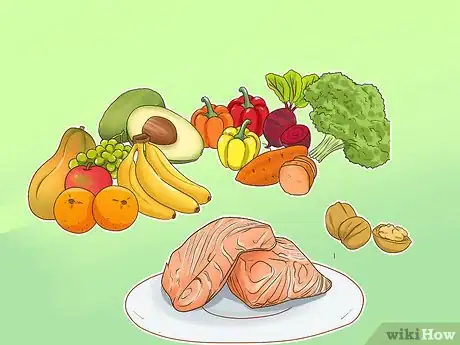
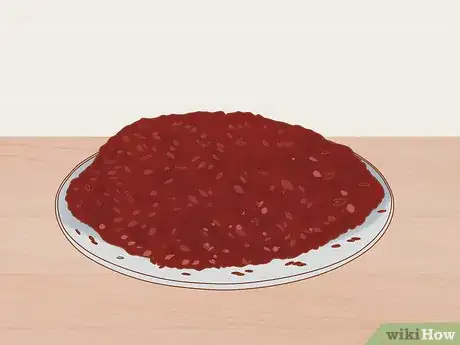

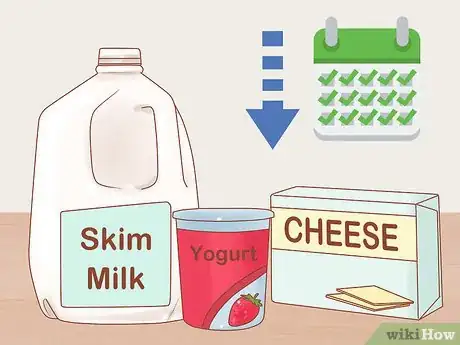
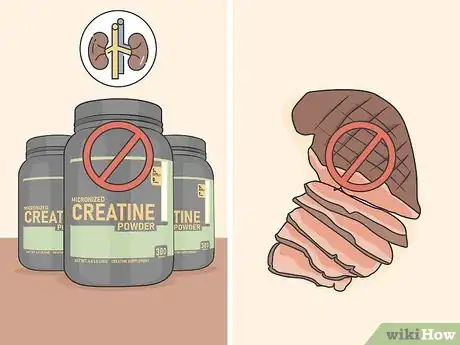

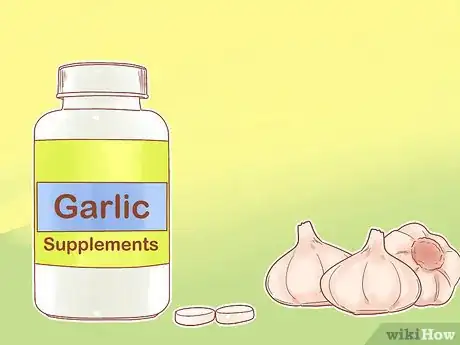

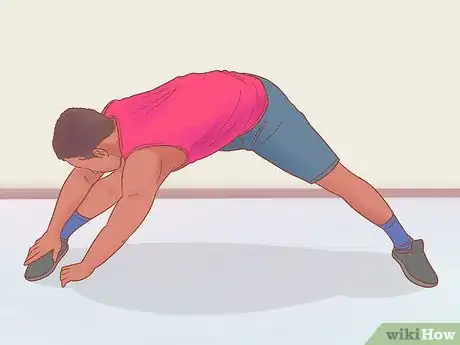

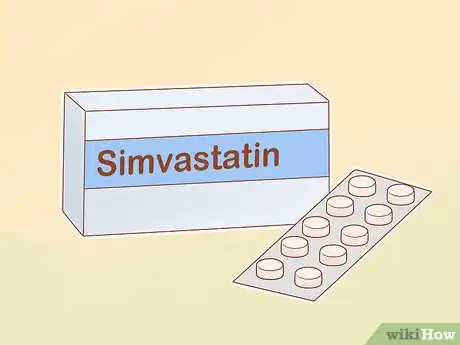
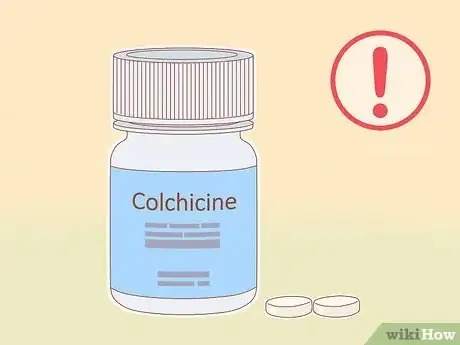
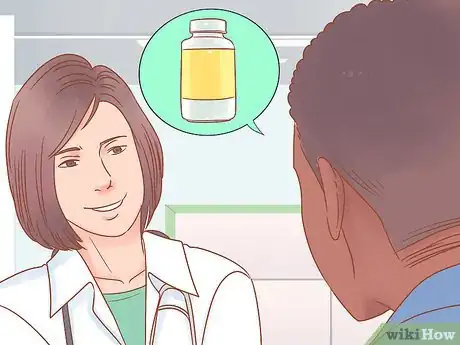
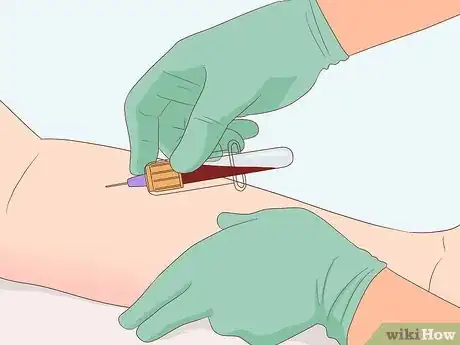

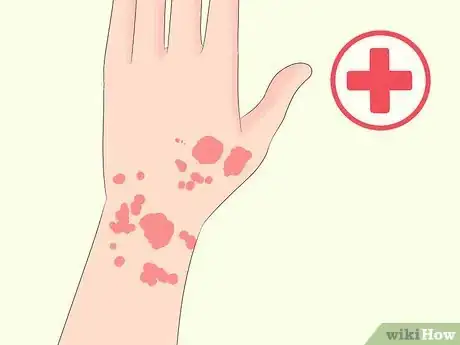
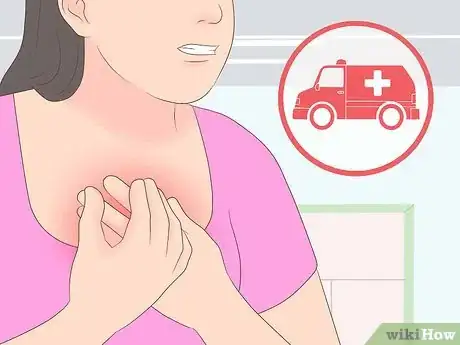
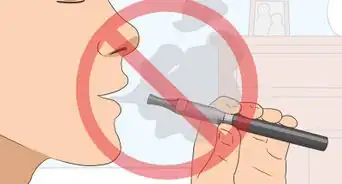
















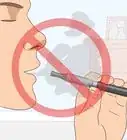
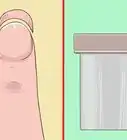






































Medical Disclaimer
The content of this article is not intended to be a substitute for professional medical advice, examination, diagnosis, or treatment. You should always contact your doctor or other qualified healthcare professional before starting, changing, or stopping any kind of health treatment.
Read More...